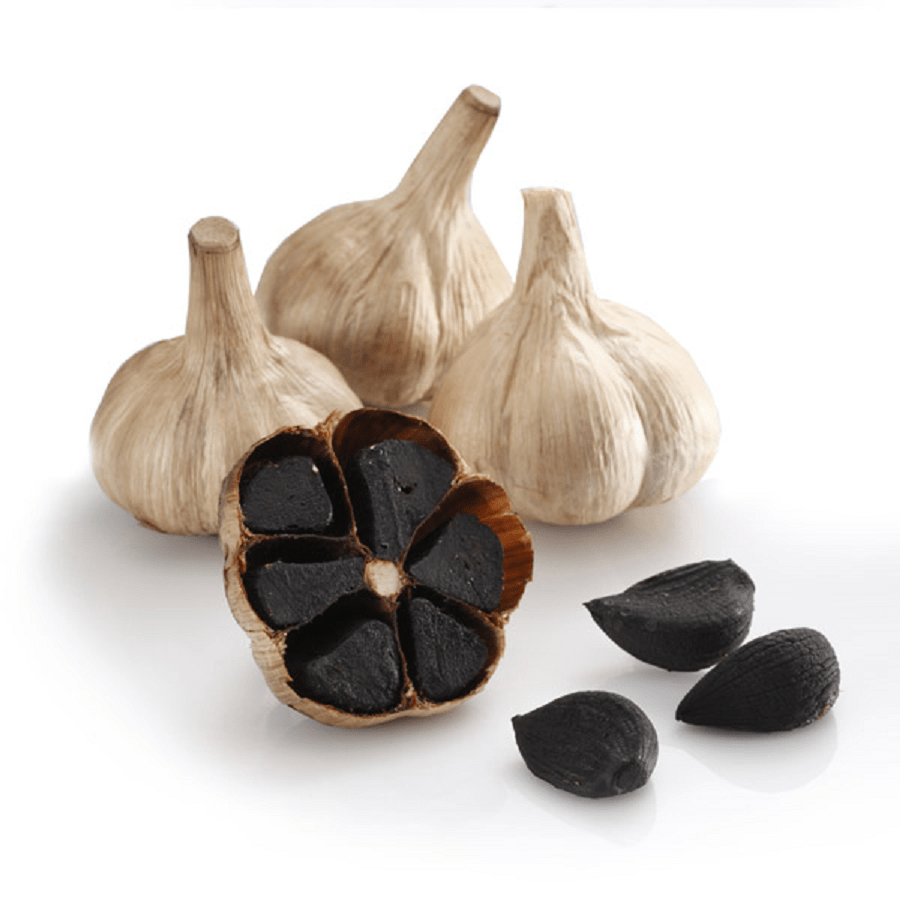Black Garlic
Allium sativum L. – Alliaceae

Fermented garlic is obtained through a fermentation process, by exposing fresh garlic to elevated temperature and humidity levels, for a longer period of time. During the fermentation process, a large number of chemical (primarily Maillard’s reaction) and enzymatic reactions occur inside the garlic, which result in a change in its color (from white to dark/black), a change in taste (it becomes sweet-sour) and the characteristic pungent smell is lost. Also, fermentation increases the presence of polyphenols and flavonoids, which are the main carriers of antioxidant properties. Furthermore, the unstable alliin is converted to the stable S(+)-allyl Cysteine, which is considered the most abundant bioactive substance, and which is attributed the following health benefits:

1. A powerful antioxidant;
2. Prevents inflammatory processes (anti-inflammatory effect);
3. Improves lipid status (reduces obesity);
4. Protects the heart and blood vessels (cardioprotective action);
5. Affects the regeneration and protection of the liver (hepatoprotective effect);
6. Lowers blood sugar (hypoglycemic action);
7. Inhibits the growth of tumor cells (antitumor effect);
8. Protects and regenerates nerve cells (neuroprotective and neuroregenerative action);
References
- Black Garlic Improves Heart Function in Patients With Coronary Heart Disease by Improving Circulating Antioxidant Levels
- The Effect of Black Garlic (Allium sativum Linn) on Cardiac and Aortic Histopathology in Experimental Studies in Obesity Rats
- Effects of an Optimized Aged Garlic Extract on Cardiovascular Disease Risk Factors in Moderate Hypercholesterolemic Subjects: A Randomized, Crossover, Double-Blind, Sustainedand Controlled Study
- In vitro studies of an aged black garlic extract enriched in S-allylcysteine and polyphenols with cardioprotective effects
- Black Garlic and Its Bioactive Compounds on Human Health Diseases: A Review
- Impact of steaming pretreatment process on characteristics and antioxidant activities of black garlic (Allium sativum L.)
- Modulation of local and systemic immune responses by fermented garlic extract
- Immune Competence and Minimizing Susceptibility to COVID-19 and Other Immune System Threats
- Chloroform extract of aged black garlic attenuates TNF-α-induced ROS generation, VCAM-1 expression, NF-κB activation and adhesiveness for monocytes in human umbilical vein endothelial cells
- The effects of allium sativum on immunity within the scope of COVID-19 infection
- Garlic (Allium sativum L.): a potential unique therapeutic food rich in organosulfur and flavonoid compounds to fight with COVID-19
- Herbal and Natural Dietary Products: Upcoming Therapeutic Approach for Prevention and Treatment of Hepatocellular Carcinoma
- Dietary Natural Products for Prevention and Treatment of Liver Cancer
- Black Garlic and Its Bioactive Compounds on Human Health Diseases: A Review
- Neuroprotection by spice-derived nutraceuticals: you are what you eat!
- Protective effects of functional foods against Parkinson’s disease: A narrative review on pharmacology, phytochemistry, and molecular mechanisms
- Gastroprotective effect of garlic in indomethacin induced gastric ulcer in rats
- The Protective Effect of Aged Garlic Extract on Nonsteroidal Anti-Inflammatory Drug-Induced Gastric Inflammations in Male Albino Rats
- Onion and garlic intake and the odds of benign prostatic hyperplasia
- Potential of S-Allyl Cysteine, a Major Bioactive Component of Garlic, As Hypoglycemic and Hypolipidemic Agent
- Lactobacillus bulgaricus improves antioxidant capacity of black garlic in the prevention of gestational diabetes mellitus: a randomized control trial
- Effect of Garlic and Aged Black Garlic on Hyperglycemia and Dyslipidemia in Animal Model of Type 2 Diabetes Mellitus
- Antioxidant effect of garlic and aged black garlic in animal model of type 2 diabetes mellitus
